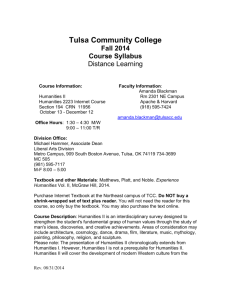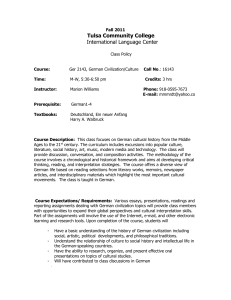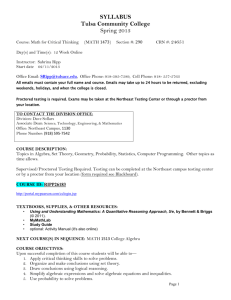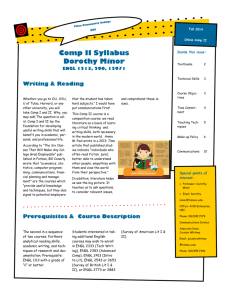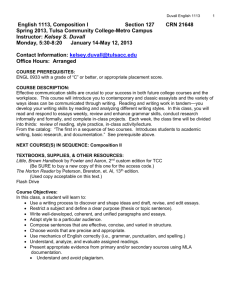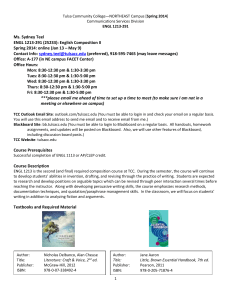english 2673 - Blackboard
advertisement
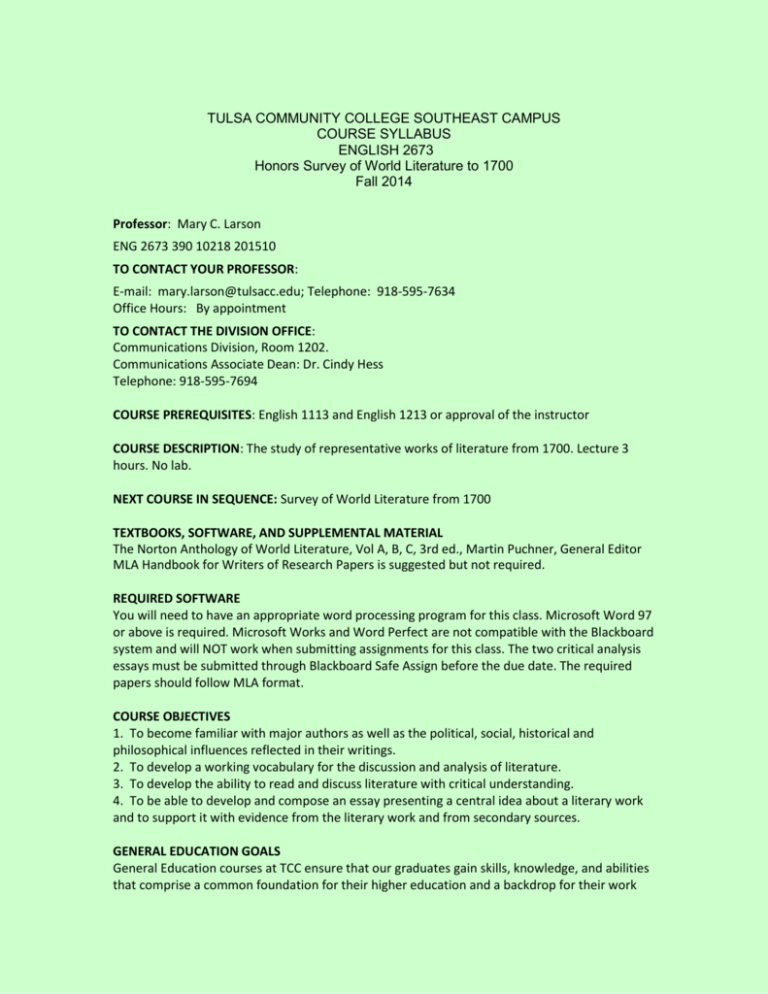
TULSA COMMUNITY COLLEGE SOUTHEAST CAMPUS COURSE SYLLABUS ENGLISH 2673 Honors Survey of World Literature to 1700 Fall 2014 Professor: Mary C. Larson ENG 2673 390 10218 201510 TO CONTACT YOUR PROFESSOR: E-mail: mary.larson@tulsacc.edu; Telephone: 918-595-7634 Office Hours: By appointment TO CONTACT THE DIVISION OFFICE: Communications Division, Room 1202. Communications Associate Dean: Dr. Cindy Hess Telephone: 918-595-7694 COURSE PREREQUISITES: English 1113 and English 1213 or approval of the instructor COURSE DESCRIPTION: The study of representative works of literature from 1700. Lecture 3 hours. No lab. NEXT COURSE IN SEQUENCE: Survey of World Literature from 1700 TEXTBOOKS, SOFTWARE, AND SUPPLEMENTAL MATERIAL The Norton Anthology of World Literature, Vol A, B, C, 3rd ed., Martin Puchner, General Editor MLA Handbook for Writers of Research Papers is suggested but not required. REQUIRED SOFTWARE You will need to have an appropriate word processing program for this class. Microsoft Word 97 or above is required. Microsoft Works and Word Perfect are not compatible with the Blackboard system and will NOT work when submitting assignments for this class. The two critical analysis essays must be submitted through Blackboard Safe Assign before the due date. The required papers should follow MLA format. COURSE OBJECTIVES 1. To become familiar with major authors as well as the political, social, historical and philosophical influences reflected in their writings. 2. To develop a working vocabulary for the discussion and analysis of literature. 3. To develop the ability to read and discuss literature with critical understanding. 4. To be able to develop and compose an essay presenting a central idea about a literary work and to support it with evidence from the literary work and from secondary sources. GENERAL EDUCATION GOALS General Education courses at TCC ensure that our graduates gain skills, knowledge, and abilities that comprise a common foundation for their higher education and a backdrop for their work and personal lives. TCC’s General Education goals are: Critical Thinking, Effective Communication, Engaged Learning, and Technological Proficiency. DISCIPLINE GOALS: 1. Effective Writing: Use appropriate techniques to communicate ideas in a unified and coherent manner. 2. Critical Reading: Analyze and evaluate increasingly complex readings while considering community and global contexts. 3. Informed Discussion: Articulate critical responses to a variety of works. TEACHING METHODS The course is totally online. Written lectures are given with assignments. Students are expected to work on individual and collaborative projects including use of the Discussion Board, use of Internet for research, and use of email. EVALUATION TECHNIQUES Course work will be measured in terms of engagement in the learning community, quality of thought and content of responses to assignments, understanding of critical analysis of texts (rather than summarizing texts), and precise use of the English language. GRADING SYSTEM Course grades will be determined on the following basis: Discussion Board participation 300 points Literary analysis essay 1 125 points Literary analysis essay 2 125 points Essay exam Vol A: 150 points Essay exam Vol B: 150 points Essay exam Vol C: 150 points GRADING SCALE 900-1000 = A; 800-899 = B; 700-799 = C; 600-699 = D; 0-599 = F ATTENDANCE In an online course, attendance consists of regular participation in the course room. Students are expected to log on to the course site several times per week and they are expected to participate in all assigned activities in the course. Engagement is crucial to success in this course as students take on the responsibility of becoming “makers of knowledge.” Engagement involves the student’s commitment to careful reading of literary texts, understanding critical analyses of texts, active participation in collaborative discussions with peers, and timely presentation of assignments. LATE ASSIGNMENTS AND MAKE-UP TEST POLICY No tests or essay assignments will be accepted for grading after the due date without prior arrangement (which must be made at least a week before the due date). Entries on the discussion board must be made early in the discussion so others have time to respond to each student’s comments. Plan to join discussion boards early in the week so that all can participate in the discussion. While a closing date is given for each discussion (see Course Schedule), participation in the discussion must be completed early enough before the due date so that other students can respond. Therefore, participation will be graded for timeliness and quality as per instructions on each discussion. Posts given late in the discussion will receive partial credit and any posts received after the date given on the schedule will not receive credit. COURSE WITHDRAWAL The deadline to withdraw from a course shall not exceed 3/4 of the duration of any class. Check the TCC Academic Calendar for the deadline that applies to your course(s). A “W” and an “AW” are grade-point neutral, but non-completion of a class may affect financial aid for the current and future semesters. Students who drop or who are dropped by an instructor after the Drop/Add period may receive an outstanding bill from TCC if the recalculation leaves a balance due to TCC. Contact the Counseling Office at any TCC campus to initiate withdrawal from a course (“W” grade) or to change from Credit to Audit. Students who stop participating in the course and fail to withdraw may be dropped from the class, resulting in an “AW” on the transcript. English Professors assign "I" grades only when genuine emergencies prevent a student from completing the class and/or from withdrawing before the deadline and only when the student is earning a satisfactory ("C" or better) grade. PLAGIARISM POLICY All work for this class must be original. Do not submit papers you have written for another class. Plagiarism is claiming, indicating, or implying that the ideas, sentences, or words of another writer are one's own, copying the work of another and presenting it as one's own, or following the work of another as a guide to ideas and expression that are then presented as one's own. If a student is determined guilty of plagiarism, the instructor will have the option of assigning an "F" or a “0” on the paper or allowing the student to rewrite it according to the instructor's specifications. To avoid plagiarism, use MLA documentation and follow the guidelines given below: To quote directly, the writer encloses in quotation marks the words of the original, and the writer supplies information, enclosed in parentheses, placed after the quotation, to refer the reader to an explanation of the source (on Works Cited page). A signal phrase-placed in the writer's text before the quotation to name its author ("According to James Wiley...," "Roger Hale asserts...," "William G. Glutz reminds us that...,")--is appropriate but not essential, for the initial quotation marks tell the reader where the quotation begins, and the source explanation tells the reader the author of the quotation. To paraphrase (to set forth an author's meaning in one's own words), the writer provides a signal phrase to identify the beginning of the paraphrase. Without this phrase, the reader cannot tell where the paraphrase begins; thus, the signal phrase is absolutely essential. The author's meaning is set forth by the writer in his or her own words. The writer must not use words, phrases, and clauses that resemble those of the author. At the end of the paraphrase, information within parentheses refers the reader to an explanation of the source. We will be using Safe Assignment for the essays required. Do not submit papers you have written for other classes. The assignments are specific to this course, and should be written with the goals of this course in mind. In order to avoid plagiarism, writers must give appropriate credit (document using MLA style) when borrowing the words or ideas of another writer. Be sure to include a signal phrase when paraphrasing the ideas of another writer. To do otherwise is a grievous academic offense and could result in failing the course. This statement is consistent with the policies of other institutions of higher education in Oklahoma. CLASSROOM ETIQUETTE Open and mutually respectful communication of varied opinions, beliefs, and perspectives during discussion encourages the free exchange of ideas that is essential to higher learning and to the ability to learn from each other. Students are expected to display tolerance for others’ views. They are also expected to refrain from the use of any inappropriate language. Student comments should be civilized and respectful to everyone and relevant to the topic being discussed. Discussions are meant to allow a variety of viewpoints. DISABILITY RESOURCES It is the policy and practice of Tulsa Community College to create inclusive learning environments. Accommodations for qualifying students in compliance with the Americans with Disabilities Act (ADA) and Section 504 of the Rehabilitation Act are available. To request accommodations, contact the Education Access Center (EAC) at eac@tulsacc.edu or call (918) 595-7115 (Voice). Deaf and hard of hearing students may text (918) 809-1864. ACADEMIC DISHONESTY Academic dishonesty (cheating) is defined as the deception of others about one’s own work or about the work of another. Academic dishonesty or misconduct is not condoned or tolerated at campuses within the Tulsa Community College system. Tulsa Community College adopts a policy delegating certain forms of authority for disciplinary action to the faculty. Such disciplinary actions delegated to the faculty include, but are not limited to, the dismissal of disrespectful or disorderly students from classes. In the case of academic dishonesty a faculty member may: Require the student to redo an assignment or test, or require the student to complete a substitute assignment or test; Record a "zero" for the assignment or test in question; Recommend to the student that the student withdraw from the class, or administratively withdraw the student from the class; Record a grade of "F" for the student at the end of the semester. Faculty may request that disciplinary action be taken against a student at the administrative level by submitting such a request to the Dean of Student Services. LEARNING SUPPORT SERVICES The Writing Center in Rm 7201 is available for your use. If you desire help on essays you are writing for this course, individual tutoring is available by making an appointment in advance. Be sure to take a copy of the assignment to clarify the goal for the paper. To make a tutoring appointment, call 595-7719. Or, you may request tutoring online (See Writing Center under Course Information). COMPUTER SERVICES ACCEPTABLE USE Access to computing resources is a privilege granted to all TCC faculty, staff, and students. Use of TCC computing resources is limited to purposes related to the college’s mission of education, research, and community service. Student use of technology is governed by the Computer Services Acceptable Use Statements/Standards found in the TCC Student Code of Conduct Policy Handbook. INSTITUTIONAL STATEMENT Each student is responsible for being aware of the information contained in the TCC Catalog, TCC Student Handbook, Student Code of Conduct Policy Handbook, and semester information listed in the class schedule. All information may be viewed on the TCC website: www.tulsacc.edu STUDENT EMAIL: Every student enrolled at Tulsa Community College is issued a TCC email account. Students are expected to check their College email account on a frequent and regular basis in order to stay current with College-related communications, particularly those that may be time sensitive in nature. Students will be held responsible for the information transmitted to the College email account. INCLEMENT WEATHER POLICY If extreme weather conditions or emergency situations arise, TCC always gives cancellation notices to radio and television stations. This information is also posted on the TCC website (www.tulsacc.edu). If you lose power, call the TCC main number (918-595-7000) for an updated, recorded message regarding closure. OTHER Occasionally, changes to the syllabus may be necessary. Students will be notified of any changes to the syllabus in writing. If genuine emergencies or problem situations occur, the course policies outlined here may be modified to help a student complete the course if the student has completed most assigned work and is earning at least a "C." It is always in your best interest, therefore, to contact me immediately if a crisis situation prevents you from completing assignments. TENTATIVE READING ASSIGNMENT SCHEDULE Read all head notes given before the literary texts. Week 1 Preface; Ancient Mediterranean and Near Eastern Literature; “Great Hymn to the Aten” The Hebrew Bible: Book of Job 2 Homer: The Iliad I; VI; IX; XVIII; XXII; XXIV 3 Ancient Athenian Drama; Aeschylus: Agamemnon 4 Early Chinese Literature and Thought: Confucius, from Analects India's Ancient Epics and Tales; Ramayana 5 Continue Ramayana discussion Bhagavad-Gita Essay 1 due 6 Travel and Conquest; Virgil: The Aeneid 7 Continue The Aeneid Medieval Chinese Literature: Tao Qian; The Peach Blossom Spring; The Return Exam A due 8 Circling the Mediterranean: Europe and the Islamic World; The Qur’an Dante; Inferno Canto I thru X; Canto XXXIII and XXXIV; 9 Continue Inferno Purgatorio Canto I and XXX; Paradiso Canto XXXIII 10 Boccaccio; Decameron Chaucer; The General Prologue; The Pardoner’s Prologue and Tale Essay 2 due Japan’s Classic Age; Sei Shonagon; The Pillow Book Murasaki Shikibu; Tale of Genji Chap 1 thru 5; Chap 25 11 12 Europe and the New World; Petrarch; Sonnets Shakespeare; Sonnets Exam B due 13 Machiavelli; The Prince Montaigne; Essays 14 Cervantes; Don Quixote 15 Thanksgiving Vacation 16 Continue Don Quixote Dec. 10: Exam C due Date of preparation: August 12, 2014

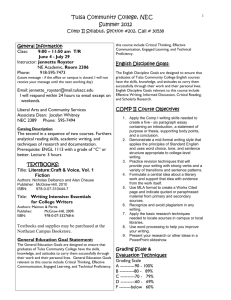
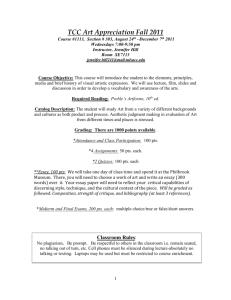
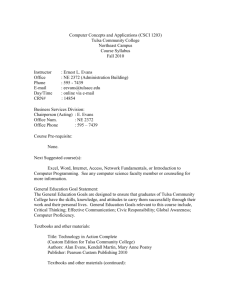
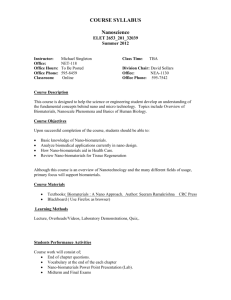
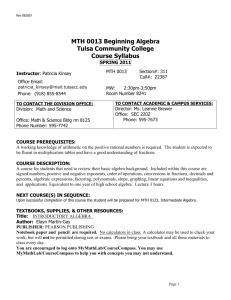

![Submission 68 [doc]](http://s3.studylib.net/store/data/008000926_1-fed8eecce2c352250fd5345b7293db49-300x300.png)
